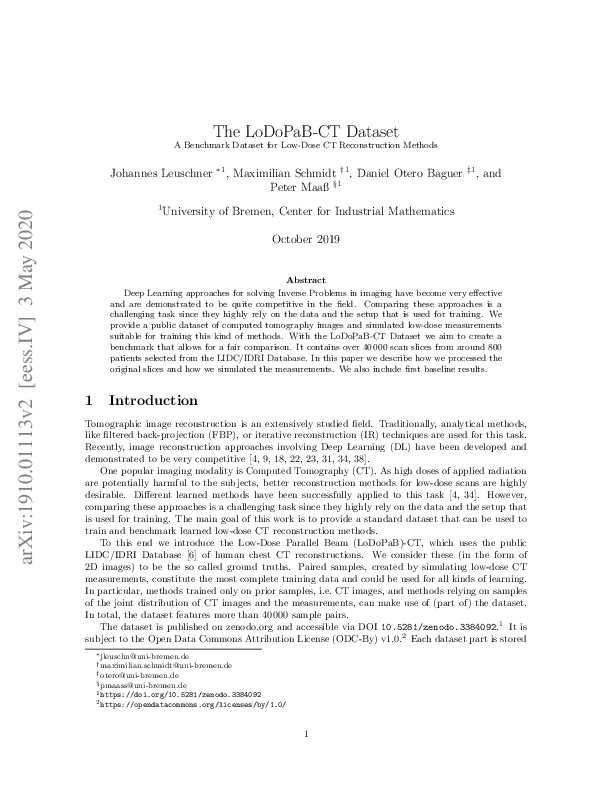Deep learning and inverse problems
The DLIP team focuses on the combination of Deep Learning methods with classical approaches for solving inverse problems. Special emphasis is put on the data-free method Deep Image Prior, the integration of physical model knowledge into the structure of artificial neural networks, and regularization. Core applications are computed tomography (CT) and magnetic particle imaging (MPI).
The DLIP team focuses on the combination of Deep Learning methods with classical approaches for solving inverse problems. Special emphasis is put on the data-free method Deep Image Prior, the integration of physical model knowledge into the structure of artificial neural networks, and regularization. Core applications are computed tomography (CT) and magnetic particle imaging (MPI).
Software & Datasets
Dival
The Deep Inversion Validation Library, Dival for short, is a Python program library for the convenient use and comparison of deep learning methods for inverse problems. The current focus of the software is in the area of computational tomography. Dival is available through the popular package manager PyPI. The program code is additionally available on Github.
LoDoPaB-CT
The Low-Dose Parallel Beam (LoDoPaB) CT dataset is a comprehensive collection of measurements and reference reconstructions for training and benchmarking deep learning reconstruction techniques for reduced radiation scan scenarios. It contains over 40000 scan slices from more than 800 different patients. The dataset is publicly available on Zenodo. Ease of use is ensured by the Dival library. In addition, the performance of trained models can be compared with other methods using an Online-Challenge.
Publications
D. Otero Baguer, J. Leuschner, M. Schmidt.
Computed Tomography Reconstruction Using Deep Image Prior and Learned Reconstruction Methods.
Inverse Problems, 36(9), IOPscience, 2020.
DOI: https://doi.org/10.1088/1361-6420/aba415
S. Dittmer, T. Kluth, P. Maaß, D. Otero Baguer.
Regularization by architecture: A deep prior approach for inverse problems.
Journal of Mathematical Imaging and Vision, :456-470, Springer Verlag, 2020.
DOI: 10.1007/s10851-019-00923-x
online unter: http://link.springer.com/article/10.1007/s10851-019-00923-x
S. . Mukherjee, S. Dittmer, Z. . Shumaylov, S. Lunz, O. Öktem, C. Schönlieb.
Learned convex regularizers for inverse problems.
Zur Veröffentlichung eingereicht.
online unter: https://arxiv.org/abs/2008.02839
S. Dittmer, T. Kluth, M. Henriksen, P. Maaß.
Deep image prior for 3D magnetic particle imaging: A quantitative comparison of regularization techniques on Open MPI dataset.
Zur Veröffentlichung eingereicht.
online unter: https://arxiv.org/abs/2007.01593
S. Dittmer, C. Schönlieb, P. Maaß.
Ground Truth Free Denoising by Optimal Transport.
Zur Veröffentlichung eingereicht.
online unter: https://arxiv.org/abs/2007.01575
S. Dittmer, P. Maaß.
A Projectional Ansatz to Reconstruction.
Zur Veröffentlichung eingereicht.
online unter: https://arxiv.org/abs/1907.04675
J. Leuschner, M. Schmidt, D. Otero Baguer, P. Maaß.
The LoDoPaB-CT Dataset: A Benchmark Dataset for Low-Dose CT Reconstruction Methods.
Zur Veröffentlichung eingereicht.
online unter: arXiv:1910.01113
S. Dittmer, T. Kluth, D. Otero Baguer, B. Maass.
A Deep Prior Approach to Magnetic Particle Imaging.
Machine Learning for Medical Image Reconstruction 2020.
Springer International Publishing, F. Deeba, P. Johnson, T. Würfl, J. C. Ye (Hrsg.), S. 113-122, 2020.
A. Denker, M. Schmidt, J. Leuschner, P. Maaß, J. Behrmann.
Conditional Normalizing Flows for Low-Dose Computed Tomography Image Reconstruction.
ICML Workshop on Invertible Neural Networks, Normalizing Flows, and Explicit Likelihood Models, 18.07-18.07.2020, Wien, Österreich.
online unter: https://invertibleworkshop.github.io/accepted_papers/index.html



